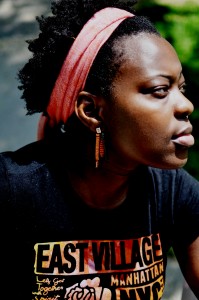Rumbi Munochiveyi is Zimbabwean mother of four and lives in Massachusettes USA. She is a new writer who loves African Contemporary writing and hopes to contribute to it in the future.
Before the Husbands, the Boys we Knew
My friend Memory should have married Suspicion from down the street or Audacity from next door but she was a little suspicious about their names.
I do not quite recall what it is that Memory despised more, the name Suspicion or his yellow wet-and-wear jump suit that he wore almost always, as though it came from his ancestors. And to further repel a girl, Suspicion wore it with matching yellow tan boots, and the look just yellowed him beyond appeal. Sassy, as his mother and friends called him, was also one of those boys who walked senselessly up and down the streets most of the day. If he wasn’t sitting by the little bridge at the end of the street whiling up time and waiting for his mother to finish cooking the next meal, he was bouncing up and down the street with his friends, pants in hand, the whole lot of them talking in loud deep voices as though they owned the streets themselves. Why Sassy and his friends let their pants fall almost below their butts, and not simply wear belts, still beats me. They did enjoy the attention they got around the neighborhood, and like it or not, you knew Sassy and his boys, more for their purposelessness than anything else.
Standing behind our gates and peeping through the net mesh of the fence, we wondered what these boys were on and on about. I know they would have loved for us to think they were a gang, but back then, with our limited knowledge of gangs, it never occurred to us to upgrade these loafers’ status to gang level. Memory, who also went by Memo, thought Sassy was good- looking, but a good-looking face was not all you looked for to date a boy at this age. At fourteen, the many aspects required to win our little “hearts” included charm, letter writing skills, an impressive wardrobe, a handsome handwriting and a remarkable knowledge of the most recent western music. Guys who knew, and went around dancing to local sungura music were the least appealing. They were parched, the girls all agreed. We believed if you married such, you moved down the street from your mother’s house, into Tonde’s mother’s kitchen and became a lodger in the same location where you grew up, insisting on continuing with the same poverty that you were raised in. So just like that, these sungura boys were ignored outright.
Sassy’s taste of music was modern, western, and acceptable, but other things had disqualified him already, especially the fear of receiving letters from him. Who knew what kind of pictures he’d send along with the letters. As for Audacity, it must have been the mere aspect of living too close for comfort that Memo despised; that, and his parents’ audacity to name him so. Despite his name and bad taste in fashion, Audacity’s broad rugby shoulders and the gentle bounce in his gait should have seen him ranking highly on Memo’s list of possible suitors. But he had a knack for saying the wrong things about anyone anywhere. He had had the audacity to call Memo his wife in a joke he shared with his friends. That, Memo did not take lightly. I remember very well, after the story spread around the neighborhood, that Aude had declared Memo his wife – I remember very well, how Memo came to my house, fuming, and asked me to accompany her to Audacity’s house, to give him a piece of her mind, a piece of our minds, if I had enough venom to spare.
When she arrived at my house that day, even her round penetrating eyes that usually brightened your day when she looked at you did not glow. You could tell that their redness not only came from the usual irritation the jacaranda trees caused them each summer, but also from the impending humiliation that awaited her as the news spread quickly through our very efficient neighborhood grape vine. It was a redness of anger, a redness of embarrassment. How could the pants-dropping guy named Audacity claim her?
“I want to shout at him like madness today! By the time I’m done with him, he’ll tell the world why a dog cannot laugh and yet grins so well. I want to remove his facial skin with my words.”
I understood Memo’s anger. Her reputation was at stake. The kind of people you attracted effectively bumped you up or down on the hotness-graph. The likes of Audacity made your taste and style questionable. He was a hunk though; just not the kind you smile at in the street. A big, disfiguring scar ran across his cheek from his forehead, and when he smiled, the scar seemed to frown at you, and you became confused not knowing whether to smile back or run. As to how he got the scar, we never got the details. No one dared ask him, lest he smile-frowns at you.
I imagined the altercation between Memo and Audacity, how it would all start, how it would gather a little hearing, a cheering crowd that would watch and cheer Memo on as she “removed Audacity’s facial skin.” I wondered if Audacity would answer with his mouth or with a flat clap from his giant foot-like hand. I did not expect a physical fight as boys never fought girls in that way.
Physical fights attracted bigger crowds…one person called out, “Fightieee fightieee fightieee,” and within seconds there’d be echoes of the message all over our co-joined houses as others repeated the message and ran in the direction the voice had originated. Passersby would forget they were rushing home for this and that, and stop to watch the fight. A circle would form quickly around the fighters, dust rising, screams becoming louder, and the fighters, wanting to be seen more, would grab on each other harder, pull on each other’s hair, and even spit out some nasty provocative phrases; your mother’s this, your mother’s that. They would wrestle and wrestle without anyone stopping them, just cheering. It’s only when they now rolled on the ground and blood began to clump the soil together into small lumps, that someone would spring from the crowd, and pull them apart, bringing the very entertaining fight to an end.
Much as my mother did not allow us to participate in such, to be seen cheering on fights, we lived for the moments we ran into these fights.
But on this day, I did not hope to witness a fight. I was happy that by the time we got to Audacity’s house, we were met by Memo’s little brother, telling us their mother was home already. We simply looked at each other and knew we could not risk being seen walking into a boy’s yard, and starting up an argument, especially the kind we had in mind. It was enough already that Memo’s mother had found, and read, a little note, passed from Aude over the fence, drenched in his father’s heavy scented cologne, that had left Memo sneezing all afternoon that day. And, how on earth were we going to stand in front of the scary hunk and remove his facial skin with our words as Memo had planned? So we quietly walked into Memo’s house and greeted her mother, then joined her in cutting up the vegetables for dinner. I stayed a little longer but could not join them for dinner, as my mother would start looking for me any time. I promised Memo, with a twitch of the eye and a little raising of one brow, that we would pursue our mission the next day and left.
The beauty of these young days was waking up on the morrow having forgotten all about yesterday. We moved on so quickly it made life simple. Memo did not pursue the Aude story and when we got to school a few days later, I told our friends about Audacity’s audacity to call Memo his wife, and all were amused. Sandi, who had a natural gift for music, even composed one fine tune where we all sang,
“Memo naAudde wake,
Memo naAudde wake,
they’ll only be separated by the heavens,
only the heavens shall separate this couple that it’s thus made,
for they can only be a match from heaven…”
We laughed and laughed about the Aude story but I dared not mention anything about Suspicion. Throwing in more than one name like that would also be bad for Memo’s graph at school. So I saved it for another school coming week.
By this time we were in High School, sent away to boarding school, where we were meant to get a Christian education from the Mission Sisters and not stay at home in schools that our mothers believed were “relaxed,” and only raised “quick city girls” who knew more about men and night lights than books. At this age, we now talked about boys in a different manor from our primary school days where it had been more giggles than anything else, little girls talking excitedly about things they barely understood.







3 comments for “Rumbi Munochiveyi”